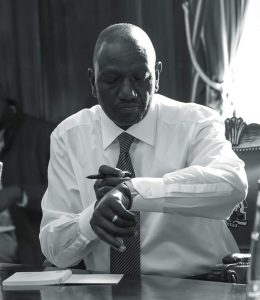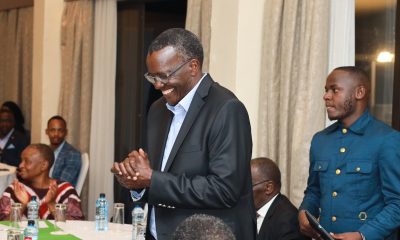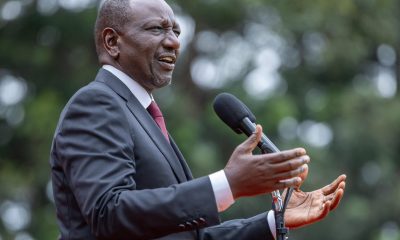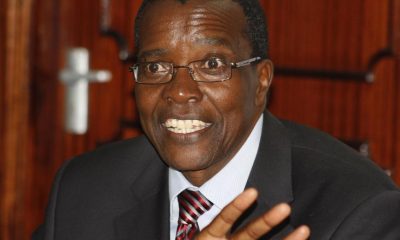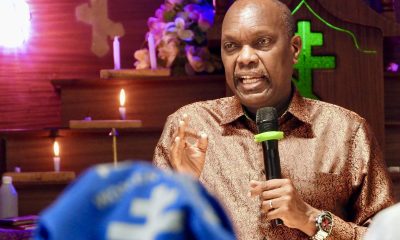Opinion
How Maraga Could Be Ruto’s Secret Weapon to Winning 2027
From President Ruto’s perspective, the Maraga candidacy represents a low-risk, high-reward scenario.
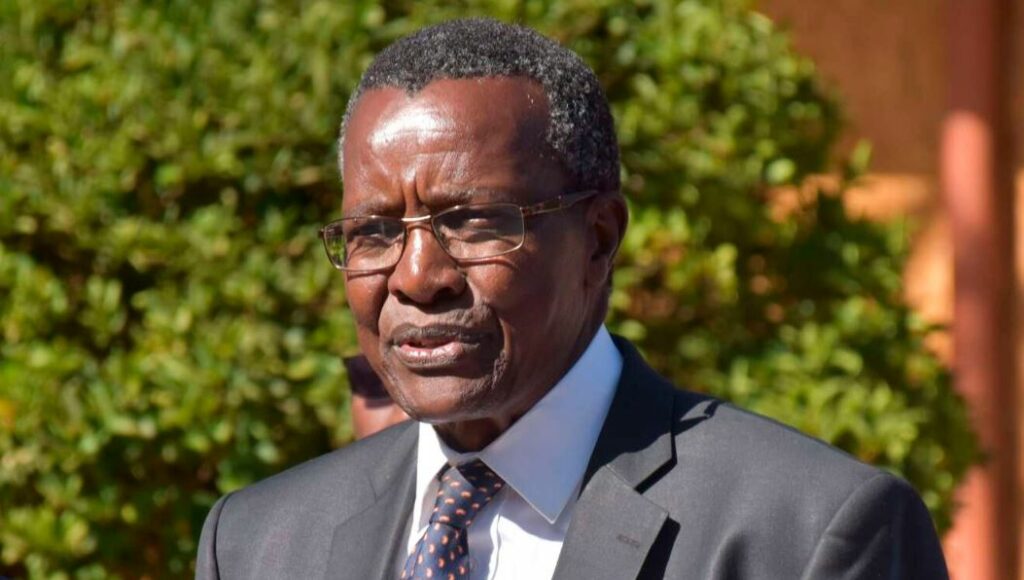
A Political Chess Move That Could Fragment the Opposition and Secure Another Term
NAIROBI, Kenya — When former Chief Justice David Maraga announced his 2027 presidential bid in June, many Kenyans saw it as the entry of a clean, principled leader into the murky waters of politics.
But beneath the surface of this seemingly independent campaign lies a sophisticated political calculation that could inadvertently — or perhaps deliberately — hand President William Ruto another term in office.
The question isn’t whether Maraga can win the presidency.
The question is whether his candidacy serves as the perfect spoiler to fragment opposition votes and neutralize the growing anti-establishment sentiment that threatens Ruto’s re-election prospects.
The perfect spoiler candidate
Maraga declared on June 18, 2024, that he would run for the presidency in 2027, pledging to crowdfund his campaign rather than depend on political financiers or wealthy backers.
This anti-establishment messaging positions him perfectly to attract disaffected voters who might otherwise support opposition candidates.
Political analysts suggest that Maraga’s entry into the race serves multiple strategic purposes for the ruling establishment.
First, it fragments the crucial Kisii voting bloc, which historically has been a stronghold for opposition candidates.
The Kisii and Nyamira counties had 637,010 and 323,283 registered voters respectively in the last election, with these counties largely supporting opposition candidate Raila Odinga.
With former Interior Cabinet Secretary Dr. Fred Matiang’i already signaling his intention to contest the presidency in 2027 with a tour in Kisii and Nyamira counties, Maraga’s candidacy creates a three-way split that could significantly reduce the opposition’s consolidated vote share from this region.
The Gen Z dilemma
Perhaps more strategically important is Maraga’s appeal to the Gen Z demographic — a voting bloc that has emerged as President Ruto’s biggest political threat. Gen Z, who staged historic nationwide protests against the Finance Bill in June last year, have become an attractive voting bloc for politicians seeking the highest office.
Gen Z voters represent 65% of the electorate, providing potential for significant disruption to historic voting patterns and preferences, being very liberal with different appeals to politics and policies.
This demographic’s disillusionment with traditional politics and their demand for accountability makes them natural opponents of any incumbent administration.
By positioning himself as the “Gen Z candidate” who understands their frustrations with police brutality and corruption, Maraga could effectively siphon away young voters who might otherwise unite behind a single opposition candidate.
Maraga is positioning himself as an outsider candidate backed by youth and reformists seeking a clean break from Kenya’s entrenched political elite.
The state project theory
The most compelling evidence for Maraga being a strategic asset to Ruto lies in their recent professional relationship.
In December 2022, President Ruto appointed Maraga to chair the Police Reforms Taskforce, a role he held for nearly a year.
While the taskforce was later ruled unconstitutional by the courts, this appointment demonstrates a level of trust and collaboration between the two figures.
There’s growing suspicion in some political quarters that Maraga’s clean image may be conveniently co-opted by power brokers aiming to split critical voting blocs, particularly the Kisii vote and the increasingly influential Gen Z electorate.
A senior political strategist, speaking on condition of anonymity, explained: “In Kenyan politics, no one runs for president without substantial backing. Maraga’s insistence on crowdfunding is either remarkably naive or brilliantly deceptive. If you want to neutralize the opposition without appearing to do so, you back a candidate who embodies their values but can’t realistically win.”
The Mathematics of victory
Kenya’s electoral system requires a candidate to win both the popular vote and meet regional distribution requirements.
For Ruto to win in 2027, he doesn’t necessarily need to increase his vote share — he just needs to ensure the opposition vote is sufficiently fragmented.
With figures like David Maraga, Martha Karua, and Kalonzo Musyoka hinting at their ambitions, the 2027 presidential race is already shaping up to be a fierce battle.
This multi-candidate field benefits the incumbent, as opposition votes get distributed across multiple candidates rather than consolidated behind a single challenger.
For the opposition to win in 2027, they need to be bigger than the sum of their regional components and engineer a wave election.
Maraga’s candidacy makes this coalition-building infinitely more difficult.
The authenticity question
The most troubling aspect of the Maraga candidacy is that it may be entirely genuine.
The former Chief Justice’s moral convictions and desire to serve Kenya are not in question. However, authentic motivations don’t preclude strategic manipulation by savvy political operators.
The 74-year-old retired jurist said his decision came after extensive consultations and deep reflection on the country’s current trajectory, particularly the government’s handling of youth-led protests.
These consultations, while well-intentioned, may have included voices that saw political opportunity in his candidacy.
The historical precedent
Kenya has a history of “project” candidates who emerge at crucial moments to serve specific political interests.
The classic example is the 2002 election when multiple candidates from different regions helped fragment the opposition vote, though in that case, it ultimately backfired on the incumbent KANU party.
Lawyer Miguna Miguna has thrown his weight behind former Chief Justice David Maraga as his preferred presidential candidate, demonstrating that Maraga’s appeal crosses traditional political lines.
This broad-based support, while validating his credentials, also makes him the perfect candidate to attract voters from across the political spectrum.
The unintended consequence
The irony of Maraga’s candidacy is that it could achieve the opposite of what he intends.
By fragmenting opposition votes and neutralizing anti-establishment sentiment, his campaign could enable the continuation of the very system he seeks to reform.
The voter of 2027 will be very progressive and forward-looking besides being sophisticated politically, with years of civic education and political engagement yielding a discernable electorate.
Yet this sophistication may be rendered irrelevant if their votes are split across multiple candidates who share similar reform agendas.
From President Ruto’s perspective, the Maraga candidacy represents a low-risk, high-reward scenario.
If Maraga fails to gain significant traction, no harm is done. If he succeeds in attracting substantial support, he likely draws it from opposition candidates rather than from Ruto’s base.
The beauty of this strategy is its deniability. Ruto can maintain plausible distance from Maraga’s campaign while benefiting from its fragmenting effect on the opposition.
The former Chief Justice’s impeccable reputation provides perfect cover for what may be a sophisticated political operation.
This analysis raises uncomfortable questions about the health of Kenya’s democracy.
While multiple candidates and diverse political choices are hallmarks of democratic societies, the strategic manipulation of electoral mathematics threatens the principle of majority rule.
The challenge for Kenyan voters in 2027 will be distinguishing between genuine political diversity and engineered fragmentation.
Maraga’s candidacy embodies this dilemma — a principled leader whose campaign may serve unprincipled political ends.
David Maraga’s 2027 presidential campaign represents the perfect storm for President Ruto’s re-election strategy.
It appeals to the right demographics, fragments crucial opposition strongholds, and provides moral legitimacy to what may be a calculated political maneuver.
Whether Maraga is a willing participant in this strategy or an unwitting pawn is ultimately irrelevant.
What matters is the effect his candidacy will have on Kenya’s electoral landscape.
In a country where elections are often decided by narrow margins, the entry of a credible candidate who appeals to opposition voters could be the difference between victory and defeat for the incumbent.
The real question facing Kenyan voters is not whether David Maraga is qualified to be president — his credentials are impeccable.
The question is whether his candidacy serves the democratic interests of the Kenyan people or the political interests of those who benefit from a fragmented opposition.
As the 2027 election approaches, this distinction may prove to be the most important factor in determining Kenya’s political future.
Kenya Insights allows guest blogging, if you want to be published on Kenya’s most authoritative and accurate blog, have an expose, news TIPS, story angles, human interest stories, drop us an email on [email protected] or via Telegram
-

 News2 weeks ago
News2 weeks agoTHE FIRM IN THE DOCK: How Kaplan and Stratton Became the Most Scrutinised Law Firm in Kenya
-

 Economy2 weeks ago
Economy2 weeks agoIran Demands Arrest, Prosecution Of Kenya’s Cup of Joe Director Director Over Sh2.6 Billion Tea Fraud
-

 Grapevine1 week ago
Grapevine1 week agoA UN Director Based in Nairobi Was Deep in an Intimate Friendship With Epstein — He Even Sent Her a Sex Toy
-

 Business2 weeks ago
Business2 weeks agoKPC IPO Set To Flop Ahead Of Deadline, Here’s The Experts’ Take
-

 Politics2 weeks ago
Politics2 weeks agoPresident Ruto and Uhuru Reportedly Gets In A Heated Argument In A Closed-Door Meeting With Ethiopian PM Abiy Ahmed
-

 Investigations1 week ago
Investigations1 week agoHow Mexico Drug Lord’s Girlfriend Gave Him Away
-

 Business2 weeks ago
Business2 weeks agoSafaricom Faces Avalanche of Lawsuits Over Data Privacy as Acquitted Student Demands Sh200mn Compensation in 48 Hours
-

 Investigations2 weeks ago
Investigations2 weeks agoKenya’s DCI Opens Probe on Russian Man Who Secretly Filmed Sex Escapades With Women — But There’s a Slim Chance They’ll Ever Get Him

